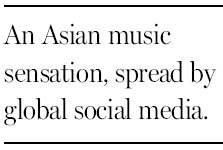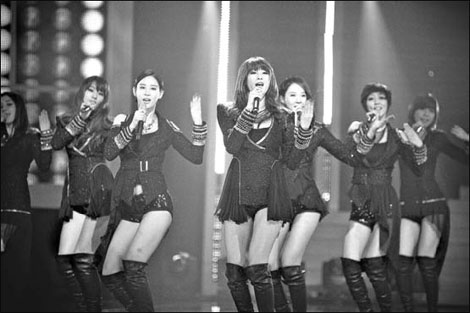From Seoul, K-pop spans the globe
Updated: 2012-03-18 08:00
By Choe Sang-Hun and Mark Russell(The New York Times)
|
|||||||
|
South Korea is exporting K-pop, a fusion of synthesized music and doe-eyed innocence. The band Nine Muses debuted in 2010 after years of rehearsals. Jean Chung for the international herald tribune |
SEOUL, South Korea - Paula Lema Aguirre, a high school student from Peru, says she is happiest when she sings Korean songs, especially "It Hurts," the group 2NE1's single about teenage love.
Ms. Aguirre is not a native Korean speaker, but that did not stop her, along with about 40 other aspiring singers from 16 countries, from making it to the finals in December of the K-Pop World Festival competition in the South Korean town of Changwon.
For South Koreans, the festival, the first of its kind, was confirmation of how widely their country's latest export has spread, first to Asia and more recently to Europe, the Middle East and the Americas, mainly because of social media.
When bands like 2NE1, Super Junior and SHINee hold concerts in Europe and the United States, tickets sell out within minutes, and fans have used Facebook and Twitter to organize flash mobs demanding more shows, as they did in Paris in May.
K-pop now has its own channel on YouTube, and the videos by bands like Girls' Generation have topped 60 million views. Girls' Generation signed with Interscope Records to release the group's latest album in the United States last autumn and made its American television debut on David Letterman's "Late Show" in January.

K-pop bands' style is a fusion of synthesized music, video art, fashionable outfits and teasing sexuality mixed with doe-eyed innocence. K-pop performances like T-ara's "Roly Poly," Wonder Girls' "Nobody" and Super Junior's "Sorry Sorry" have repetitive choruses, often interspersed with English. Their synchronized dance routines have become such a fad in Asia that children, soldiers and inmates imitate the dancing.
South Korea is one of the most wired countries in the world, and digital piracy devastated its music scene. The industry regrouped by focusing more on digital distribution and touring.
Yet being savvy with career moves, social media and marketing is not enough - hard work and talent still matter. South Korea's "star-management" agencies select and train aspiring teenage singers, often housing them together. With the international market in mind, the agencies require trainees to learn a foreign language.
For the singers in Nine Muses, the training began at 1 p.m. each day. Electric music throbbed and managers yelled encouragement as the women danced for 10 to 12 hours, seven days a week, for up to four years before the group made its debut in 2010.
A global exporting powerhouse, the country had always chafed at its lack of cultural exports that would let the rest of the world know that it was more than a maker of Hyundai cars and Samsung cellphones.
But now, said Andrew Kang, the arts and recording director at Star Empire Entertainment in Seoul: "K-pop has become Korea's killer content."
Choe Sang-hun reported from Seoul, and Mark Russell reported from Barcelona, Spain.
The New York Times
(China Daily 03/18/2012 page12)
